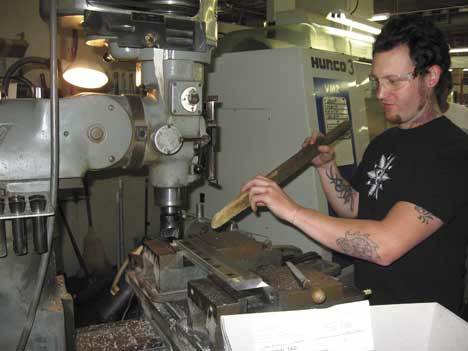As Baby Boomers begin to retire from the workforce, one field that is feeling the effect is manufacturing, which is losing older workers faster than younger ones can replace them.
In the Kent Valley, approximately 60,000 are employed in manufacturing jobs, but many are nearing the end of their respective careers.
“Forty to 60 percent of these people are eligible for retirement in the next five to 10 years,” said Tom McLaughlin, executive director for the Kent-based Center for Advanced Manufacturing Puget Sound, known by its acronym CAMPS.
According to McLaughlin, that means anywhere between 24,000 and 36,000 manufacturing jobs should open up in the next decade.
“Many of these people are also the highly skilled,” he added. “They’re the guys and gals that have been running this equipment.”
At the same time, many business are having trouble filling spots as they grow and attempt to expand their workforce.
“We have experienced difficulty in growing,” said Tom Brosius, general manager of Orion Industries, a Federal Way-based company that is a member of CAMPS. “We’re all saying the same thing.”
Brosius said his company, which manufactures airline parts for Boeing and other companies, has had a challenge finding qualified employees to run complex equipment.
But while more and more manufacturing jobs are opening up, McLaughlin said schools are no longer turning out workers geared toward the needs of many modern manufacturing businesses.
According to McLaughlin, it is because schools do not necessarily put an emphasis on such jobs and because the equipment on which students are being trained is at least a generation behind those being used in the actual workplace.
“All of a sudden the skills are so much different,” McLaughlin said. “What we’re talking about are 21st century manufacturing jobs.”
To help meet the needs of local businesses in this quandary, CAMPS has developed a “structured on-the-job training” program that will allow participating businesses to train employees in place, on the machines they will be using.
According to McLaughlin, the key to the training program will be the “structure,” which will allow for one-on-one or one-on-two learning, speeding up the training process.
“It’s hitting the critical points,” McLaughlin said, adding that while it may take years to learn the skills in a classroom setting, on-the-job training can cut that to months and even weeks.
It is the structured part that drew Brosius and his business into being part of the CAMPS pilot program, which will begin this summer.
“We need the structured classroom training and formal curriculum,” Brosius said.
Brosius said it is “surprising” how few people are exposed to manufacturing as a career path, adding “it can pay very well.” Brosius said part of the problem may be pressure in the schools to get on the path to a degree instead of a vocational or technical program that would provide the skills needed on manufacturing floors.
“It’s amazing how hard it is to find these folks,” he said, though he added that since the economic downturn, there have been more qualified candidates applying for work.
Randy Gardiner, president of Seattle-based Red Dot Corporation, agreed, adding that manufacturing jobs are often stereotyped as dirty and difficult, turning potential employees off from the business.
“Most jobs and businesses are very clean and very safe,” he said, adding that those interested in the trades are usually lured away to larger companies such as Boeing, leaving smaller industries searching.
“The folks we see are those that are new Americans and those perhaps just out of school,” Gardiner said.
McLaughlin said the workforce is one of the primary issues on which CAMPS was formed, making programs such as this part of their core mission.
“They know they can’t run their business without skilled employees,” McLaughlin said of CAMPS members.
For example, one of the main positions that manufacturers need filled is a computer numerically controlled (CNC) operator, a position that McLaughlin said can yield up to $35 an hour within three years of starting in the business. The machines can be programmed to perform hundreds of functions including drilling, cutting and shaping highly precise items, but need operators to run them.
McLaughlin said the on-the-job training program is designed not only for recent grads, but also immigrants, veterans and those looking for a career change.
McLaughlin said the program is mostly funded by a grant from BuRSST for Prosperity, a King County group dedicated to helping lifting people out of poverty, but industries involved each have to have some “skin in the game” to participate.
“They have to be committed,” McLaughlin said, though he didn’t elaborate on what corporate contributions would be.
McLaughlin said CAMPS will hire the trainers, with the pilot program scheduled to begin in August.
For more information on CAMPS, visit www.camps-us.com.
Talk to us
Please share your story tips by emailing editor@kentreporter.com.
To share your opinion for publication, submit a letter through our website https://www.kentreporter.com/submit-letter/. Include your name, address and daytime phone number. (We’ll only publish your name and hometown.) Please keep letters to 300 words or less.

